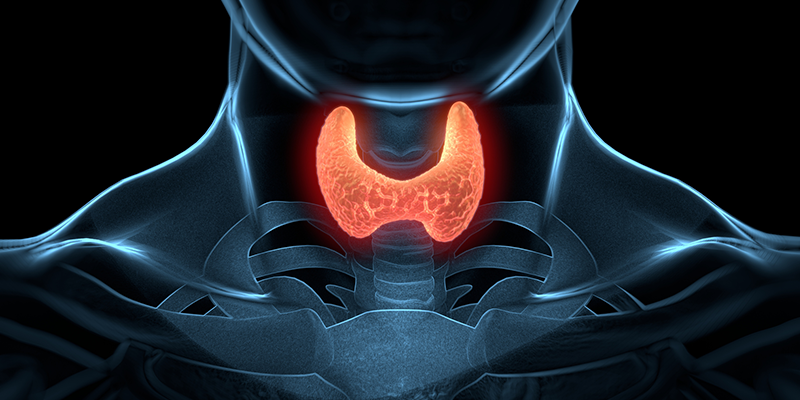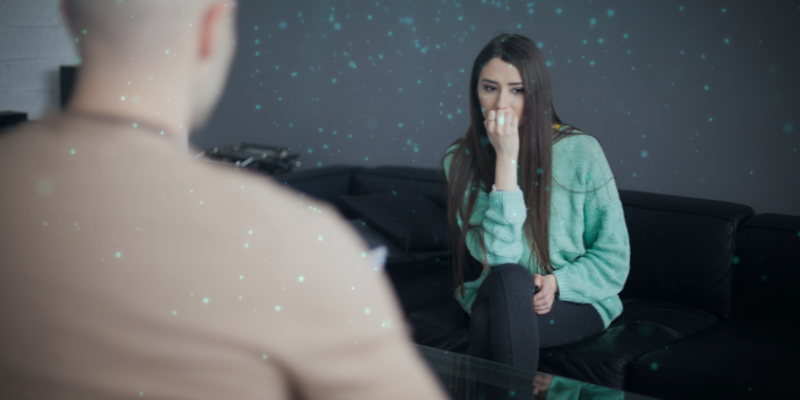
Content updated from previous publish date.
Are you struggling with low moods? Do you feel fatigued all the time? Are you trying to lose weight but can’t seem to drop the pounds despite eating a healthy diet? It could be due to a thyroid problem. Normal and healthy thyroid hormone levels are essential for optimal brain and body health. Low thyroid function, called hypothyroidism, can cause many physical and mental problems including depression, fatigue, poor memory, obesity, diabetes, high cholesterol, and more.
Low thyroid function, called hypothyroidism, can cause many physical and mental problems including depression, fatigue, poor memory, obesity, diabetes, high cholesterol, and more. Click To Tweet
WHAT IS THE THYROID GLAND?
The thyroid is a small, butterfly-shaped gland located in your lower neck. Although it is small, it has a big impact on the health of your brain and body. This gland produces three main thyroid hormones—thyroid stimulating hormone (TSH), T3, and T4. They are among the most important neurohormones in the human body. Thyroid hormones are involved in regulating how your body uses energy. It also has a strong impact on the brain because it controls the production of many neurotransmitters, such as dopamine, serotonin, and GABA.
For optimal brain and body function, these three thyroid hormones must be produced in the proper balance. Problems develop when thyroid dysfunction causes hormonal imbalances in which the gland to produce too little hormone (hypothyroidism) or too much hormone (hyperthyroidism).
SIGNS AND SYMPTOMS OF HYPOTHYROIDISM
Patients with low thyroid function, even if it’s not severe, can have problems with mood, cognitive function, and memory loss. Patients with depression tend to have higher rates of hypothyroidism than those of the general population.
Signs and symptoms of hypothyroidism include:
- Depression
- Fatigue
- Unexplained weight gain
- Difficulty concentrating
- Impaired memory
- Increased sensitivity to cold
- Constipation
- Dry skin
- Puffy face
- Hoarseness
- Muscle weakness
- Elevated blood cholesterol level
- Muscle aches, tenderness, and stiffness
- Pain, stiffness, or swelling in your joints
- Heavier than normal or irregular menstrual periods
- Thinning hair
- Slowed heart rate
HYPOTHYROIDISM IS HIGHLY UNDERDIAGNOSED
Hypothyroidism is one of the most common diseases in the world. It is more prevalent than hyperthyroidism and more widespread than people—including many in the medical field—think it is. Current research shows that nearly 5 out of every 100 people ages 12 and up in the U.S. suffer from hypothyroidism. According to the American Thyroid Association, thyroid problems are 5-8 times more likely to occur in women than in men, and 1 in 8 women will develop a thyroid disorder during their lifetime.
Even more alarming is the fact that up to 7% of the United States population has undiagnosed hypothyroidism, according to a 2021 study.
There are several reasons for the high level of underdiagnosis. Low awareness of the disorder is one issue, which results in many people mistakenly attributing their symptoms to some other condition. The biggest problem, however, is the fact that there are inconsistencies in how thyroid levels are tested. Three are 5 blood tests that may be used in the diagnosis of hypothyroidism:
- TSH
- T4
- T3
- Free T3
- Reverse T3
The American Thyroid Association offers a more comprehensive look at each of these tests. Many physicians, however, use just one or two tests, which may not provide an accurate picture of thyroid health.
WHY IS HYPOTHYROIDISM SO COMMON?
There are many factors contributing to the prevalence of hypothyroidism, many of which are environmental. Of the three main types of thyroid hormones, T-3 is by far the most important active thyroid hormone in the body. However, in order to make active T-3 the body has to convert inactive T-4 via an enzyme process, and therein lies the problem. It turns out that this enzyme process is highly susceptible to interference from a variety of things. Factors that inhibit thyroid production include but are not limited to:
- Excess stress and cortisol production
- Deficiencies in vitamins B12 and B9, iron, ferritin, iodine, or selenium
- Deficient protein, excess sugar
- Chronic illness
- Compromised liver or kidney function
- Cadmium, mercury, or lead toxicity
- Herbicides and pesticides
- Oral contraceptives
- Excessive estrogen production
- Damage to the pituitary gland, often due to head injuries
EFFECTIVE, NATURAL TREATMENTS FOR HYPOTHYROIDISM
Strategies that promote healthy neurohormone function include:
- Limit anything that hurts your hormones.
- Avoid endocrine disruptors, such as pesticides and other toxins.
- Support healthy hormones with exercise, adequate sleep, a healthy diet, and stress management.
- Take nutraceuticals, such as l-tyrosine, zinc, iodine, and ashwagandha extract, which support thyroid function.
If you’re coping with depression, mood issues, fatigue, or unexplained weight gain, it may be time to check your thyroid levels. Even if your doctor has told you your thyroid tests are “normal,” your signs and symptoms may still point to low thyroid function and need to be evaluated more closely.
Depression, fatigue, hormonal imbalances, and other mental health issues can’t wait. At Amen Clinics, we’re here for you. We offer in-clinic brain scanning and appointments, as well as mental telehealth, clinical evaluations, and therapy for adults, teens, children, and couples. Find out more by speaking to a specialist today at 888-288-9834 or visit our contact page here.





In The Brain in Love, Dr. Amen describes the ugly appearance of a SPECT scan of the brain of someone who is hypothyroid. Can you please send me more information on this topic?
Comment by Kathleen Jacques — May 5, 2018 @ 6:14 PM
I am on a lowered dose of levothyroxine…75mcg……..was always on 88mcg. Dr. wanted to see if my own thyroid would function. Saw an endocrinologist who told me to take the medication at least 1 hour before eating so it could absorb better. It is now a 3 months later and I still have fatigue, depression, memory problems, and many of the other symptoms. I know how delicate the balance is….,…was in ER twice with PVCS’ and I don’t want that to happen again.
I am a 77 year old female, overweight and tired of it. HELP!
Comment by Susan Laughrin — June 13, 2018 @ 7:43 AM
Can you help me?
Comment by Eva Glik — June 13, 2018 @ 8:20 AM
Hello Eva, yes we’d be happy to have a Care Coordinator reach out to directly via email. Thank you.
Comment by Amen Clinics — June 13, 2018 @ 8:29 AM
I had Thyroid cancer and a complete Thyroidecyomy in 09 there Is no research (I can find) on long term effects of Synthroid and keeping your TSH super low. What effects happen on synthetics. I am aware of the bone density effect. I am post menopausal since 2010, and all sorts of things are happening.
Depression weight gain, pretty much everything in article
Comment by Marivi Wolfe — June 13, 2018 @ 8:54 AM
My wife had PVCs for years, recently our BP machine reported an irregular heartbeat.
We called the doctor’s office, they said go to the ER immediately.
Tests showed she had very low levels of potassium.
After getting four bags of pot she felt much better.
Pot = potassium… Just saying.
She hasn’t had a PVC nor a report of irregular heartbeat since.
Sometimes we have a serious problem with an easy answer.
Doctor took her off of her diuretic gave her some potassium pills and suggested bananas as snacks.
A friend of mine was very low in magnesium that resulted in developing a-fib.
Two ablations later he is OK.
We have been youtubing our way through different ways to take care of electrolytes and minerals.
Maybe you can get a blood test concentrating on potassium, etc?
Comment by Bill — June 13, 2018 @ 11:08 AM
Susan Laughlin, I highly recommend joining a group on Facebook called Adrenal Fatigue and Thyroid Care. We are all in the same boat as you, but many are further along and point you in the right direction. The admins are highly knowledgeable and can interpret your lab work. For starters, read the book Stop the Thyroid Madness by Janie A. Bowthorpe. Last but not least, you need a better doctor! But read the book first. There is hope!
Comment by Kristine York — June 13, 2018 @ 4:20 PM
I’m taking armourthyroid 60 mg. I heard that levothyroxine is better. Can I have my dr switch me to l-thyroxine? If so what dose would I take that’d be equivalent to 60 mg armor thyroid. How often should I have thyroid levels tested?
Comment by Jen — September 5, 2018 @ 10:54 PM
Is there a clinic in Stlouis Missouri
Comment by Robin Bargen — January 28, 2019 @ 7:08 PM
Hello Robin, we currently have 8 clinics in the U.S. https://amenclinics.com/locations/.
Comment by Amen Clinics — January 29, 2019 @ 3:52 PM
What if you have had a complete thyroidectomy and take 200 mcg levothyroxine and 5mg of cytomel. You still have all the symptoms mentioned in article and can’t take harmones, so harmone replacement therapy is out of question. What do you do?…. what do you suggest?…
Comment by Gegi — January 23, 2022 @ 6:05 PM
I don’t understand why there is noy an Amen Clinic in Philadelphia. With the great medical facilities here (Jefferson, University of PA, etc.) I think it would be easy to find office space! We are in the middle between DC and NYC, and it is difficult enough for us with chronic conditions to go into Philly (but we do!) let alone travel all the way to NYC or DC.
Comment by Patticia Jillard — January 24, 2022 @ 9:51 PM
Hello Patticia, thank you for reaching out. We plan to expand into Philadelphia, PA. Stay tuned with our company updates, we hope to be closer to you in the coming year or two!
Comment by Amen Clinics — January 26, 2022 @ 9:32 AM
I have low normal
Thyroid after taking Synthroid for over sixty years . .075 My Dr. Change me to .050
What Does a low normal thyroid mean ??
Comment by Shirley. — January 16, 2023 @ 12:33 PM
Many years ago I had an overactive thyroid. Was treated with Radioactive Iodine and have been on levothyroxine 100 MCG tablets. I also exercise, sometimes with weights, eat well and take vitamins. I am going to add some of the natural treatments mentioned above. Have taken Thyroid Care before (Iodine). It has been about 20 years since the Radioactive Iodine. So far, so good. One of my Doctors tried me on NP Thyroid and I had a terrible rection to it after only two tablets.
Comment by Juanita A East — January 24, 2023 @ 4:54 AM